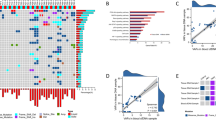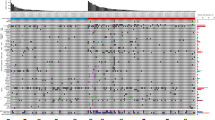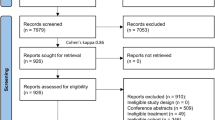Abstract
Background
The appropriate management of localized or metastatic hormone-sensitive prostate cancer (HSPC) patients harboring tumor BRCA mutations (tBRCAm) is not well-characterized. We sought to evaluate the prevalence and clinical outcomes of patients with tBRCAm and localized or de novo metastatic HSPC.
Methods
We performed a multicenter, international, retrospective cohort study of localized (cohort 1) and de novo metastatic (cohort 2) HSPC patients who underwent tumor BRCA1 and BRCA2 sequencing from 2013 to 2019. Primary endpoints included event-free survival (EFS) and metastases-free survival (MFS) for cohort 1, and time to castration-resistant prostate cancer (TTCRPC) and overall survival (OS) for cohort 2. Kaplan–Meier method and Cox regression models estimated the association of endpoints with tBRCA status.
Results
Of 399 identified patients with localized and de novo metastatic HSPC who underwent tumor BRCA1 and BRCA2 sequencing, 3.1% (8/258) patients of cohort 1 and 10.6% (15/141) patients of cohort 2 harbored tBRCAm. The median follow-up was 33 and 36 months, respectively. In cohort 1, median EFS was 18.1 vs. 57 months (p = 0.28) and MFS was 37 vs. 153.4 months (p = 0.08) for patients with tBRCAm compared to patients with no tBRCAm. In cohort 2, the TTCRPC was 24 vs. 19 months (p = 0.65) and OS was 64 vs. 60 months (p = 0.95) in patients with and without tBRCAm, respectively.
Conclusions
While tBRCAm seems to be associated with greater relapse risk in localized disease, tBRCAm did not influence the clinical outcomes of patients presenting with de novo metastatic HSPC treated with conventional therapies. tBRCAm may exert different prognostic effects across the clinical spectrum of prostate cancer.
This is a preview of subscription content, access via your institution
Access options
Subscribe to this journal
Receive 4 print issues and online access
$259.00 per year
only $64.75 per issue
Buy this article
- Purchase on Springer Link
- Instant access to full article PDF
Prices may be subject to local taxes which are calculated during checkout



Similar content being viewed by others
References
Schaeffer E, Srinivas S, Antonarakis ES, Armstrong AJ, Bekelman JE, Cheng H, et al. National Comprehensive Cancer Network (NCCN Guidelines). Prostate cancer Version 1.2021.
VanderWeele DJ, Antonarakis ES, Carducci MA, Dreicer R, Fizazi K, Gillessen S, et al. Metastatic hormone-sensitive prostate cancer: clinical decision making in a rapidly evolving landscape of life-prolonging therapy. J Clin Oncol. 2019;37:2961–7.
Sweeney CJ, Chen Y-H, Carducci M, Liu G, Jarrard DF, Eisenberger M, et al. Chemohormonal therapy in metastatic hormone-sensitive prostate cancer. N Engl J Med. 2015;373:737–46.
James ND, Sydes MR, Clarke NW, Mason MD, Dearnaley DP, Spears MR, et al. Addition of docetaxel, zoledronic acid, or both to first-line long-term hormone therapy in prostate cancer (STAMPEDE): survival results from an adaptive, multiarm, multistage, platform randomised controlled trial. Lancet. 2016;387:1163–77.
Fizazi K, Tran N, Fein L, Matsubara N, Rodriguez-Antolin A, Alekseev BY, et al. Abiraterone plus prednisone in metastatic, castration-sensitive prostate cancer. N Engl J Med. 2017;377:352–60.
James ND, De Bono JS, Spears MR, Clarke NW, Mason MD, Dearnaley DP, et al. Abiraterone for prostate cancer not previously treated with hormone therapy. N Engl J Med 2017;377:338–51.
Davis ID, Martin AJ, Stockler MR, Begbie S, Chi KN, Chowdhury S, et al. Enzalutamide with standard first-line therapy in metastatic prostate cancer. N Engl J Med. 2019;381:121–31.
Cancer Genome Atlas Research Network. The molecular taxonomy of primary prostate cancer. Cell. 2015;163:1011–25.
Robinson D, Van Allen EM, Wu YM, Schultz N, Lonigro RJ, Mosquera JM, et al. Integrative clinical genomics of advanced prostate cancer. Cell. 2015;161:1215–28.
Abida W, Armenia J, Gopalan A, Brennan R, Walsh M, Barron D, et al. Prospective genomic profiling of prostate cancer across disease states reveals germline and somatic alterations that may affect clinical decision making. JCO Precis Oncol. 2017. https://doi.org/10.1200/PO.17.00029.
Armenia J, Wankowicz SAM, Liu D, Gao J, Kundra R, Reznik E, et al. The long tail of oncogenic drivers in prostate cancer. Nat Genet. 2018;50:645–51.
Stopsack KH, Nandakumar S, Wibmer AG, Haywood S, Weg ES, Barnett ES, et al. Oncogenic genomic alterations, clinical phenotypes, and outcomes in metastatic castration-sensitive prostate cancer. Clin Cancer Res. 2020;26:3230–8.
Deek PA, Van der Eecken K, Phillips R, Parikh NR, Velho PI, Lotan TL, et al. The mutational landscape of metastatic castration-sensitive prostate cancer: the spectrum theory revisited. Eur Urol. 2021. https://doi.org/10.1016/j.eururo.2020.12.040.
Pomerantz MM, Spisak S, Jia L, Cronin AM, Csabai I, Ledet E, et al. The association between germline BRCA2 variants and sensitivity to platinum-based chemotherapy among men with metastatic prostate cancer. Cancer. 2017;123:3532–9.
Zafeiriou Z, Bianchini D, Chandler R, Rescigno P, Yuan W, Carreira S, et al. Genomic analysis of three metastatic prostate cancer patients with exceptional responses to carboplatin indicating different types of DNA repair deficiency. Eur Urol. 2019;75:184–92.
Cheng HH, Pritchard CC, Boyd T, Nelson PS, Montgomery B. Biallelic inactivation of BRCA2 in platinum-sensitive metastatic castration-resistant prostate cancer. Eur Urol. 2016;69:992–5.
Mateo J, Carreira S, Sandhu S, Miranda S, Mossop H, Perez-Lopez R, et al. DNA-repair defects and olaparib in metastatic prostate cancer. N Engl J Med. 2015;373:1697–708.
Mateo J, Porta N, Bianchini D, McGovern U, Elliott T, Jones R, et al. Olaparib in patients with metastatic castration-resistant prostate cancer with DNA repair gene aberrations (TOPARP-B): a multicentre, open-label, randomised, phase 2 trial. Lancet Oncol. 2020;21:162–74.
De Bono J, Mateo J, Fizazi K, Saad F, Shore N, Sandhu S, et al. Olaparib for metastatic castration-resistant prostate cancer. N Engl J Med. 2020;382:2091–102.
Abida W, Bryce AH, Vogelzang NJ, Amato RJ, Percent I, Shapiro JD, et al. Preliminary results from TRITON2: a phase 2 study of rucaparib in patients with metastatic castration-resistant prostate cancer associates with homologous recombination repair gene alterations. Ann Oncol. 2018;29:viii271–302.
Smith MR, Sandhu SK, Kelly WK, Scher HI, Efstathiou E, Lara PN, et al. Pre-specified interim analysis of GALAHAD: a phase 2 study of niraparib in patients with metastatic castration-resistant porostate cancer and biallelic DNA-repair gene defects. Ann Oncol. 2019;30:v851–934.
Annala M, Struss WJ, Warner EW, Beja K, Vandekerkhove G, Wong A, et al. Treatment outcomes and tumor loss of heterozygosity in germline DNA repair–deficient prostate cancer. Eur Urol. 2017;72:34–42.
Gallagher DJ, Cronin AM, Milowsky MI, Morris MJ, Bhatia J, Scardino PT, et al. Germline BRCA mutation does not prevent response to taxane-based therapy for the treatment of castration-resistant prostate cancer. BJU Int. 2012;109:713–9.
Castro Marcos E, Romero-Laorden N, Piulats Rodriguez JM, Del Pozo A, Saez MJ, Medina Colmenero A, et al. PROREPAIR-B: a prospective cohort study of DNA repair defects in metastatic castration resistant prostate cancer. Ann Oncol. 2017;28:LBA32.
Mateo J, Cheng HH, Beltran H, Dolling D, Xu W, Pritchard CC, et al. Clinical outcome of prostate cancer patients with germline DNA repair mutations: retrospective analysis from an international study. Eur Urol. 2018;73:687–93.
Castro E, Goh C, Leongamornlert D, Saunders E, Tymrakiewicz M, Dadaeu T, et al. Effect of BRCA mutations on metastatic relapse and cause-specific survival after radical treatment for localized prostate cancer. Eur Urol. 2015;68:186–93.
Scher HI, Morris MJ, Stadler WM, Higano C, Basch E, Fizazi K, et al. Prostate Cancer Clinical Trials Working Group 3: trial design and objectives for castration-resistant prostate cancer: updated recommendations from the prostate cancer clinical trials working group 3. J Clin Oncol. 2016;34:1402–18.
De Bono JS, Mateo J, Fizazi K, Saad F, Shore N, Sandhu S, et al. Final overall survival (OS) analysis of PROfound: Olaparib vs physician’s choice of enzalutamide or abiraterone in patients (pts) with metastatic castration-resistant prostate cancer (mCRPC) and homologous recombination repair (HRR) gene alterations. Ann Oncol. 2020;31:S507–49.
Author information
Authors and Affiliations
Contributions
Conception and design: NMC, BB, AAH, and CJS. Acquisition of data: NMC, BB, PB, AA, and AAH. Analysis and interpretation of data: NMC, BB, AAH, and CJS. Critical revision of the manuscript for important intellectual content: all authors. Statistical analysis: MP and AAH. Supervision: AAH and CJS.
Corresponding author
Ethics declarations
Conflict of interest
NMC reports support for research travel from Pfizer, Janssen and Ipsen, and consulting fees for BMS, Pfizer, Sanofi, and Bayer. TR reported supports for reseach travel from Janssen and consulting fees for BMS, Pfizer, MSD, and Astellas. Disclosure statement for CJS, MBBS: Consulting or Advisory Role: Sanofi, Janssen, Astellas Pharma, Bayer, Genentech, AstraZeneca, Pfizer, Lilly, Research Funding: Janssen Biotech (Inst), Astellas Pharma (Inst), Sanofi (Inst), Bayer (Inst), Dendreon (Inst); Patents, Royalties, Other Intellectual Property: Pathenolide (Indiana University): dimethylaminoparthenolide (Leuchemix); Exelixis: Abiraterone plus cabozantinib combination. Stock or Other Ownership: Leuchemix. Other authors do not declare any conflict of interest.
Additional information
Publisher’s note Springer Nature remains neutral with regard to jurisdictional claims in published maps and institutional affiliations.
Supplementary information
Rights and permissions
About this article
Cite this article
Martinez Chanza, N., Bernard, B., Barthelemy, P. et al. Prevalence and clinical impact of tumor BRCA1 and BRCA2 mutations in patients presenting with localized or metastatic hormone-sensitive prostate cancer. Prostate Cancer Prostatic Dis 25, 199–207 (2022). https://doi.org/10.1038/s41391-021-00397-2
Received:
Revised:
Accepted:
Published:
Issue Date:
DOI: https://doi.org/10.1038/s41391-021-00397-2



